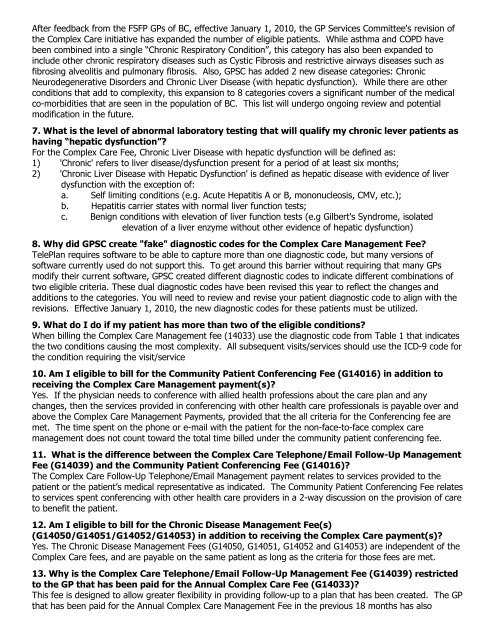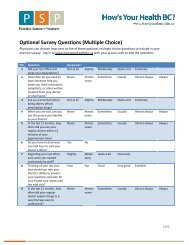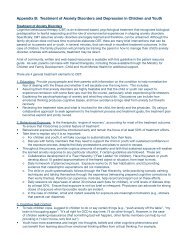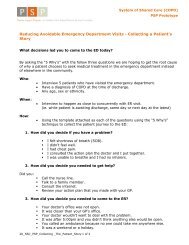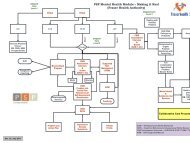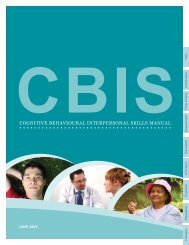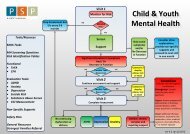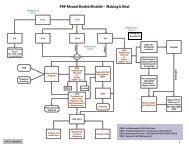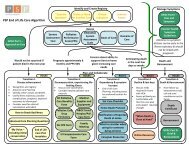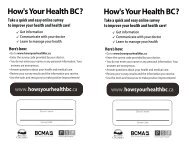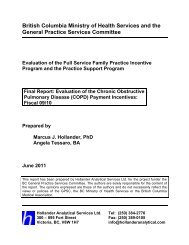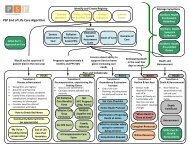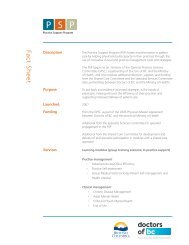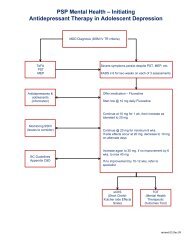Complex Care Incentives - GPSC
Complex Care Incentives - GPSC
Complex Care Incentives - GPSC
Create successful ePaper yourself
Turn your PDF publications into a flip-book with our unique Google optimized e-Paper software.
After feedback from the FSFP GPs of BC, effective January 1, 2010, the GP Services Committee's revision ofthe <strong>Complex</strong> <strong>Care</strong> initiative has expanded the number of eligible patients. While asthma and COPD havebeen combined into a single “Chronic Respiratory Condition”, this category has also been expanded toinclude other chronic respiratory diseases such as Cystic Fibrosis and restrictive airways diseases such asfibrosing alveolitis and pulmonary fibrosis. Also, <strong>GPSC</strong> has added 2 new disease categories: ChronicNeurodegenerative Disorders and Chronic Liver Disease (with hepatic dysfunction). While there are otherconditions that add to complexity, this expansion to 8 categories covers a significant number of the medicalco-morbidities that are seen in the population of BC. This list will undergo ongoing review and potentialmodification in the future.7. What is the level of abnormal laboratory testing that will qualify my chronic lever patients ashaving “hepatic dysfunction”?For the <strong>Complex</strong> <strong>Care</strong> Fee, Chronic Liver Disease with hepatic dysfunction will be defined as:1) 'Chronic' refers to liver disease/dysfunction present for a period of at least six months;2) 'Chronic Liver Disease with Hepatic Dysfunction' is defined as hepatic disease with evidence of liverdysfunction with the exception of:a. Self limiting conditions (e.g. Acute Hepatitis A or B, mononucleosis, CMV, etc.);b. Hepatitis carrier states with normal liver function tests;c. Benign conditions with elevation of liver function tests (e.g Gilbert's Syndrome, isolatedelevation of a liver enzyme without other evidence of hepatic dysfunction)8. Why did <strong>GPSC</strong> create "fake" diagnostic codes for the <strong>Complex</strong> <strong>Care</strong> Management Fee?TelePlan requires software to be able to capture more than one diagnostic code, but many versions ofsoftware currently used do not support this. To get around this barrier without requiring that many GPsmodify their current software, <strong>GPSC</strong> created different diagnostic codes to indicate different combinations oftwo eligible criteria. These dual diagnostic codes have been revised this year to reflect the changes andadditions to the categories. You will need to review and revise your patient diagnostic code to align with therevisions. Effective January 1, 2010, the new diagnostic codes for these patients must be utilized.9. What do I do if my patient has more than two of the eligible conditions?When billing the <strong>Complex</strong> <strong>Care</strong> Management fee (14033) use the diagnostic code from Table 1 that indicatesthe two conditions causing the most complexity. All subsequent visits/services should use the ICD-9 code forthe condition requiring the visit/service10. Am I eligible to bill for the Community Patient Conferencing Fee (G14016) in addition toreceiving the <strong>Complex</strong> <strong>Care</strong> Management payment(s)?Yes. If the physician needs to conference with allied health professions about the care plan and anychanges, then the services provided in conferencing with other health care professionals is payable over andabove the <strong>Complex</strong> <strong>Care</strong> Management Payments, provided that the all criteria for the Conferencing fee aremet. The time spent on the phone or e-mail with the patient for the non-face-to-face complex caremanagement does not count toward the total time billed under the community patient conferencing fee.11. What is the difference between the <strong>Complex</strong> <strong>Care</strong> Telephone/Email Follow-Up ManagementFee (G14039) and the Community Patient Conferencing Fee (G14016)?The <strong>Complex</strong> <strong>Care</strong> Follow-Up Telephone/Email Management payment relates to services provided to thepatient or the patient’s medical representative as indicated. The Community Patient Conferencing Fee relatesto services spent conferencing with other health care providers in a 2-way discussion on the provision of careto benefit the patient.12. Am I eligible to bill for the Chronic Disease Management Fee(s)(G14050/G14051/G14052/G14053) in addition to receiving the <strong>Complex</strong> <strong>Care</strong> payment(s)?Yes. The Chronic Disease Management Fees (G14050, G14051, G14052 and G14053) are independent of the<strong>Complex</strong> <strong>Care</strong> fees, and are payable on the same patient as long as the criteria for those fees are met.13. Why is the <strong>Complex</strong> <strong>Care</strong> Telephone/Email Follow-Up Management Fee (G14039) restrictedto the GP that has been paid for the Annual <strong>Complex</strong> <strong>Care</strong> Fee (G14033)?This fee is designed to allow greater flexibility in providing follow-up to a plan that has been created. The GPthat has been paid for the Annual <strong>Complex</strong> <strong>Care</strong> Management Fee in the previous 18 months has also


